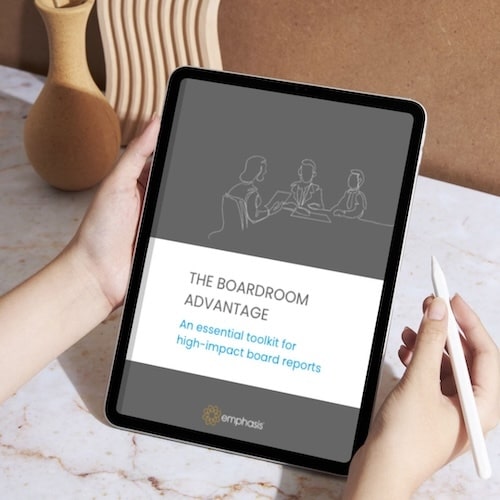

‘What people don’t realise,’ Nick said, ‘is that I’m just like them. I get tired. I worry about stuff. I think maybe I should get to the gym more. And I have too much on my plate. I’m not superhuman.’
Nick is the European COO of a company that employs 130,000 people. He’s 46, and he joined the board two years ago after a steady rise to the top in a rival organisation. We were meeting in Bishopsgate, in the heart of London’s financial district.
I’d imagined he’d scheduled our chat to talk about how he and the other members of the board could improve the quality of the reports they received each month. But it was clear from his whole demeanour that he needed to get something else off his chest first – something that he’d been bottling up for a long time.
Because, while Nick is (of course) right that he’s only human, his job is not just like everyone else’s.
Toughest challenges
What he told me reminded me of how a doctor friend had recently been lamenting that his job seems to be getting harder and harder.
The friend – let’s call him Michael, though that’s not his real name – is nearing retirement. Yet it’s not his age that’s the issue but seniority of a different kind.
Three years ago, he stepped up to the role of managing partner in a large general practice. He works with ten other doctors plus other medical staff and a clerical team. And Michael described how it feels like they all save up their toughest questions especially for him.
As a result, he’s found his job has become an endless string of sometimes life-and-death decisions just at the point in life where he’d like to start easing off a bit. He is, as you might imagine, exhausted.
Inside a board member’s mind
Nick faces a similar challenge to Michael’s. If an issue has reached him, it’s because no-one else has been able to deal with it. (If they could have, they would have.) And while lives don’t hang in the balance when he makes a decision, most of the solutions available to him do have a downside.
Often there’s no totally right answer. Each option usually has at least one negative side effect too. Increasing spend in one area probably means cutting someone else’s budget. Expand the size of one team and HR could find themselves opening redundancy talks with colleagues in another.
And nowhere is this more apparent than in the reports he has to read before the board meets in the second week of each month.
How many reports?
‘How many of those do you have to read?’ I asked.
‘Typically, about a hundred.’
One hundred documents. For one meeting. Every month. Some run to over 30 pages. Most contain questions for which there is no right or wrong answer. It can be exhausting, stressful work. I asked him how he coped.
‘Sometimes the only way to make decisions is with simple arithmetic,’ he explained. ‘I use the concept of expected value. I multiply the probability of something happening by the value of the outcome – negative or positive. Then I base my decision mainly on the number. Any other information is just commentary.’

Discover the secret of successful board reports
These people are busy. Not busy in the way that they have too many things on their to-do list (though they probably have). Busy in that their brains are almost full of information and probably working to near-maximum capacity. And it’s with those same maxed-out minds that they need to make critical decisions.
Demigods
So what does all this mean for you when you write a board report? Well, the first lesson is to remember that your readers are just as human as you are. They get tired. They’re overloaded. They have good days and bad days.
That may sound obvious, but just keeping that in mind can make your board report not just more effective but a lot easier to write.
The first piece of advice we usually give those who want to improve their communication is: make sure you know your audience. But this can be very difficult if you’ve never even met a board member.
Many people imagine them to be almost demigods. But nothing could be further from the truth. In reality, your typical reader may not be that different from Nick.
If you want to make an impact – a real impact – imagine stepping into his shoes and how hard making so many critical decisions must be.
Think of how many other board papers they have to read besides yours. Consider how you can make their lives easier by giving them just the right amount of information they need – and no more.
Expert’s dilemma
In practice, this won’t be easy. It involves dealing with what I call the expert’s dilemma.
Because you almost certainly are an expert compared with your reader, at least in the topic you’re writing about. Yes, they are senior to you. But, unlike them, you’ve probably been working on your project for months. You know every detail.
You may have been down endless research rabbit holes. Maybe you’ve lost whole weekends trying to wrestle key data. It’s not them but you who’s compared countless spreadsheets, staring at your screen until it felt like your eyes would bleed.
You know way more than you realise. The only reason it doesn’t feel like it is that you know how much more there is to know. (This is the curse of knowledge: the culprit behind almost every case of impostor syndrome.)
You’ll face an almost irresistible temptation to include all the facts you’ve gathered together.
But resist it you must. Because the more information you include beyond what’s strictly necessary, the bigger the chance that they won’t read it. Put it all in and most of your hard work will almost certainly go to waste.
Whittle it down
So whittle it down. Structure it. Take the board through a logical thought process. Make the crucial information the most easily accessible and put it in context. Help them make the right decision, rather than dumping the information on them. Have the confidence to avoid Documentese.
Nick is typical. Every board member will recognise something of themselves in him. His job may be different from yours. But he’s still just as human as the rest of us. They all are.
Remembering just that one fact will make your board report stand out for all the right reasons.
Free ebook
Our new ebook, The boardroom advantage, is out now. It’s packed with actionable, expert advice that will help your board reports drive better decisions, whether you write them or read them. Get your free copy here.
This article was substantially revised and updated on 12 August 2025.
Subscribe
Expert advice to your inbox



